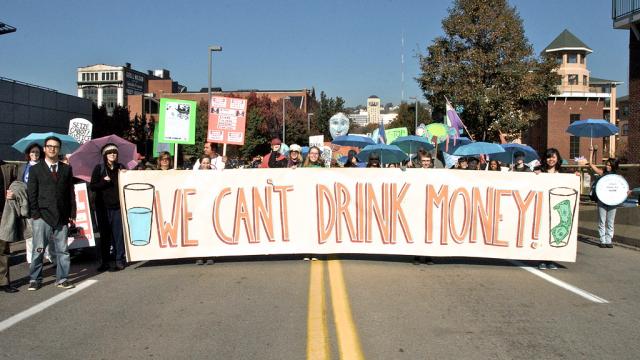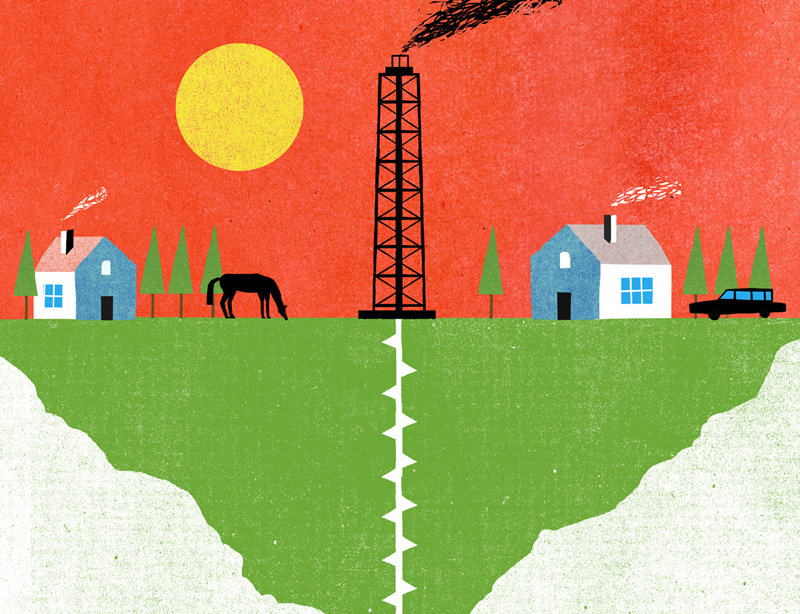
There will be no fracking on French soil. The ban is final – “absolute” – says the government. France’s highest court has spoken.
The ruling handed down Oct. 11 is a major victory for the global anti-fracking movement pitting local communities, from California to Poland, against multinational oil and gas companies.
Schuepbach Energy, based in Dallas, had challenged the 2011 French ban on four counts. All were dismissed in the recent decision. The court’s ruling said the law “conforms to the constitution.”
“It’s a legal, environmental and political victory,” said France's Energy and Environment Minister Philippe Martin, and part of a larger struggle to limit fossil fuels.
“Beyond the question of fracking, shale gas is a carbon emitter,” he said. “We must set our priorities on renewable energies.”
According to the International Energy Agency, France, along with Poland, has the greatest source of shale gas in Europe. But, “France is not the United States,” said José Bové, the French environmental activist who rose to global fame during the Seattle WTO protests in 1999.
A Green Party deputy in the European Parliament, Bové started a petition against fracking in 2011. “There is no elected official who would take the risk of saying ‘I’m for fracking’ in his own backyard," he added.
"More than 80% of the French are opposed. I do not believe the ban will ever be overturned.”
The month of October could prove to be a turning point in the battle over fracking in Europe. Under EU law, member states can exploit their natural resources as they see fit, subject to relatively minimal environmental standards. On October 9, the EU Parliament gave preliminary approval to a law mandating a full environmental impact study for large-scale fracking.
The new rules require audits based on “the direct and indirect significant effects” on human health, animal species and habitats, land, water and climate.
"Our water is too precious to put at risk with very high risk drilling techniques such as fracking,” said Andrea Zanoni, an Italian liberal member of Parliament.
Europe’s largest economy, Germany, has put fracking on hold. The Social Democratic Party, likely to become ruling coalition members with the Christian Democratic Union, officially oppose the practice. So do environmental scientists advising the current government.
They are joined by Bavaria’s beer brewers who are alarmed that fracking could pollute the water used in brewing. Most of Germany's brewers adhere strictly to the 1516 Reinheitsgebot (German Beer Purity Law), the country’s oldest consumer protection measure that says beer can only be produced using malt, hops and pure water.
In the UK as well, high-profile protests have begun to erode public support for fracking despite the efforts of conservative Prime Minister David Cameron, who is so enthusiastic he has been branded a fracking “cheerleader.” The rural village of Balcombe was the scene this summer of a two-month protest by thousands of people who prevented the drilling of a test well by Cuadrilla Resources, a company backed by U.S. private equity.
Cuadrilla's fracking license has now expired, but may be extended. If the license isn’t renewed, say anti-frack activists with No Dash for Gas, it could be decisive in stopping the practice in the UK for good. Caroline Lucas, a Green member of British parliament, was arrested along with 100 others because she fears that “our children and grandchildren will inherit a more dangerous world.”
Further east, Chevron has a license to drill for shale gas in Romania and in the Black Sea, but faces protests by environmentalists, local politicians and everyday citizens in places like Pungesti: when a Chevron convoy arrived there recently to drill a test well, the villagers forced it turn back, led by a phalanx of schoolchildren holding up signs reading “Stop Chevron” and “Go Home.”
Anti-fracking protestors are hoping that Romania will follow the example of neighboring Bulgaria. Chevron was given a license to drill in Bulgaria’s most fertile farm region, Dobrudja. But street protests by farmers who descended on the capital Sofia convinced lawmakers in the National Assembly to vote overwhelmingly for a ban in January 2012.
Now, it is Poland, with the largest estimated reserves in Europe, which looms as the frontline in the continent’s fracking wars. The Polish government, hoping to ease its dependence on Russia for fuel and energy, is fully committed to hydraulic fracturing. It has granted 111 exploration concessions covering about one-third of the country.
But grassroots opposition is growing in places like Zurawlow, a small village in southeastern Poland. The people of Zurawlow have maintained a blockade for over four months, called Occupy Chevron, to prevent the Richmond, Calif.-based company from launching operations there.
On the same day France refused to become the world’s next shale gas hub, the International Energy Agency announced that the United States was only months from becoming the world's second largest oil and gas producer, surpassing Russia. Climate scientists are alarmed. The United States’ wholesale embrace of the fracking boom, domestically, internationally and for export, could accelerate global warming, according to Colorado’s National Center for Atmospheric Research.
President Barack Obama’s climate action plan describes natural gas as a “bridge fuel for many countries” in a transition to cleaner sources of energy. For Ken Caldeira, a researcher at the Carnegie Institution for Science, America’s natural gas – much of which now comes from shale – is “a bridge to a world with high CO2 levels, melting ice caps, acidified oceans ….. It puts new investment money in the fossil fuel industry and expands the size of [its] political force."
Fracking is the process of blasting millions of gallons of water and chemicals deep underground to extract natural gas or crude oil from fractured rocks and shale. Its environmental risks include the contamination of soil and drinking water and the release of methane, a potent greenhouse gas.
3 WAYS TO SHOW YOUR SUPPORT
- Log in to post comments

















